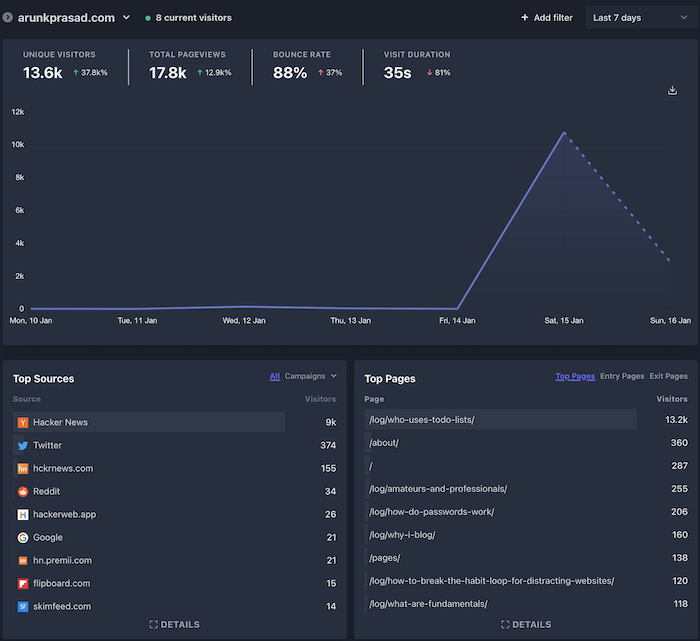On My Incandescent Hacker News Stardom
2022-01-16
Yesterday I dashed off a post on successful people who use to-do lists. I thought I'd get used to others reading my work and shared it on Hacker News.
No big deal, right?

Oh.
It's a surprising thing to reach the number 4 spot on Hacker News. I'm grateful for the audience but ambivalent about what this means. So I'm sharing what I've learned in case it's useful to others.
How I did it
I didn't put any thought into it. But in retrospect, there were some factors in my favor:
-
I submitted at around 10 in the morning on Saturday because that's when I finished the post. But according to one analysis I saw, this is the peak post time for Saturdays.
-
I meant the title (Who Uses To-Do Lists?) as an honest question that I answered honestly. I didn't foresee that this would be prime fodder for discussion: the title bakes in just enough controversy to draw a click, and it's on a subject everyone has an opinion about.
-
In fact, most of the comments give no clear evidence of having read the post, i.e. they would likely look the same even if the only thing I had published was the title. A hot discussion topic with no effort required — why wouldn't it blow up?
I'm grateful to everyone who added to the discussion, and I learned a lot about the different workflows people use. But I do feel a little sad about that.
Still, the conclusion of my post was ultimately the boring but timeless point that no system is perfect for everyone and you should use whatever you can turn into a habit, so I can see why that didn't make for gripping discussion. And I know there's a selection bias at play here.
How I feel about it
I know how much people want to be on the front page, and I'm glad if my post was helpful to someone. I'm grateful.
At the same time, I've learned for the first time what it's like to be public, and there are clear downsides that I'm not sure how to handle going forward:
-
I was thinking about my submission for most of the day. What was otherwise a peaceful day with family had a distracted quality that I wasn't sure how to handle. I spent much of the day dipping in and out to check Hacker News.
I think the first time is the hardest with these things, and I think it will be less affecting in the future.
-
I felt validated by seeing my forum karma rise. It's not nothing, but I would rather not invest any personal energy in a number like that.
If this becomes a serious issue, I'll install a plugin to hide my post and account karma.
-
My attention felt lower-grade than usual. I'm still working through how I feel about deep work and attention economies, but the kind of work I want to do is incompatible with the feelings I was having yesterday.
I think I can fix this by just time-blocking. I don't need to spend all day reading and replying to comments. Someone who has an important point to make can just contact me directly.
-
I've started thinking about what my audience wants to read about rather than what I want to write about. Analytics, in particular, make reader interest quantifiable.
It helps that I have a solid sense of self and know what's important to me. I also think that I can learn to tune these numbers out, mainly by not making a habit of checking them.
-
I'm more accountable now. Now that this blog is read by people outside my circle of family and friends, I need to be a little more responsible with how I maintain and serve it.
Thankfully this is a super-simple static site, but I'll be more careful about erroneously publishing drafts in the future.
While I work through some of these issues, I'll probably hold back on posting to HN. (But if you like something I post, feel free!)
What I learned about blogging
-
Get to the point. At peak, the average visit duration to my site was about 20 seconds. You don't have much time to make your point clear. Make sure your site loads quickly and your writing gets to the point.
-
The reader doesn't know you. Jokes and sarcasm become more ambiguous and can be taken as literal statements. I need to learn how to balance this. Relatedly, the reader can't immediately grasp your mental throughlines. Make sure you lead to a clear and concrete conclusion.
-
If you want people to subscribe, make it easy. I ended up putting a subscription form at the bottom of each page. It's not obnoxious, but it's easy, and it's a natural place for a call to action.
-
Ship. If you don't expose your work to the world, how will you know what the outcome will be? The people who matter will understand and forgive your imperfections. In retrospect, I could have done more to make my point clear. But I'm glad that I biased toward action.
The stats
- Peak rank: 4
- Total views: around 17,500
- Total upvotes: 206
- Total comments: 195
- Number of mailing list sign-ups: 19 (21 if including people I know)
- Job leads: 2
Thanks to Plausible for the lightweight and privacy-friendly analytics, ConvertKit for the dead-simple signup form, and my friends Rahul and Charlie for reminding me to add these things in the first place.